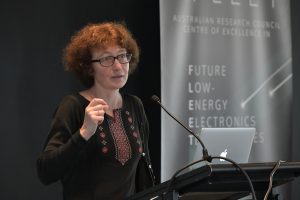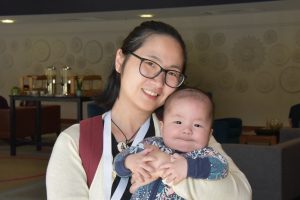
“It was really heart-warming to learn, from verbal responses to our equity and diversity survey, that our members are grateful to be part of a Centre that acknowledges the importance of equity and diversity, and that our newest members find FLEET’s efforts in this space “extremely amazing”. We must be doing something right…”
Prof Elena Ostrovskaya
Chair, Equity and Diversity Committee
Women are under-represented in science, particularly in physics. In this regard FLEET is no exception. We are taking steps to improve this.
Research confirms that diverse teams do better science. We know that by improving our performance with respect to gender equity and diversity, we are not only doing what’s fair, we will also improve the effectiveness of our research teams.
Change does not ‘just happen’. We have realised that we need to set and enforce targets, in particular, in recruitment. The necessary change will not happen ‘organically’.
FLEET’s target in 2019 was 20% female researchers across all cohorts. We have maintained our 2018 numbers of female higher degree by research (HDR) students (24%) and advisers and liaisons (21%). Women in FLEET Fellowships and Strategic Fund grants have allowed us to increase the number of female research fellows to 17% (from 7% in 2018) and associate investigators to 31% (from 17% in 2018).
The Centre’s goal for 2020 is 25%, and ultimately to reach 30% representation of women at all levels.
However, we are still below our overall target, so much work remains to be done.
A particular focus for the Centre must be to increase the representation of women in senior roles.
FLEET’s recruitment in its first two years drew from the existing physics pool, which unfortunately has a relatively low percentage of women. FLEET’s Women in FLEET Fellowships and strategic grants have allowed the Centre to begin to increase the percentage of women at early-career researcher (ECR) and associate investigator levels, above the average in physics.
Redressing historical disadvantages for women in physics provides many complex challenges, and our actions must cut across all of FLEET’s strategies and policies. Internal surveying of experiences and attitudes will help us maximise the chance of success for these changes.
In 2019, FLEET has…
- Increased the representation of women across the Centre, from 16% to 23%, with:
– Six new female associate investigators (out of 13)
– Three Women in FLEET PhD scholarships
– Three Women in FLEET Fellowships
“Being a mum of two little boys makes business travel difficult, either with or without kids. FLEET’s carer grant allowed me to bring my husband to care for our kids at FLEET’s annual workshop. Along with on-site childcare, this meant I could participate fully in the workshop, networking with peers instead of worrying too much about the little ones.”
Dr Peggy Qi Zhang
FLEET Research Fellow, UNSW - Shared our learnings, publishing a women-only recruitment case study
- Established career-support initiatives
- Co-supported scholarships for Women & Leadership Australia’s Leading Edge program, sponsoring seven successful FLEET participants
- Provided a carer’s support fund and childcare at FLEET meetings
- Established a women-specific mentoring network, with 13 female mentors
- Welcomed eight new external female mentors
- Formed new, long-term partnerships with ANU to support MAGIC and DCA programs
- Improved members’ access to equity resources and information via web, intranet and monthly newsletter articles, including FLEET and external programs, and Centre policies
- Identified challenges and recorded member experiences, via a comprehensive equity and diversity survey.
In 2020 FLEET will…
- Implement priorities informed by a 2019 comprehensive survey of Centre members
- Provide an avenue for easy feedback about any experiences of an exclusive environment or discrimination
- Implement FLEET-wide cultural awareness (working with the Diversity Council of Australia)
- Improve awareness of equity and diversity training and education opportunities (including via the internal newsletter and website)
- Increase the visibility of women in FLEET
- Expand our mentoring and training programs for ECRs and HDR students
- Offer opportunities for inter-node social interactions and community building, to develop understanding and acceptance across cultural and other barriers.

